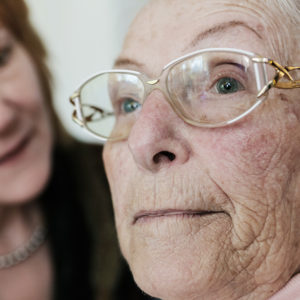
When a loved one becomes forgetful, their thinking becomes sluggish, and their ability to care for themselves diminishes, a dementia-related illness could be the cause.
Symptoms can include loss of memory, poor judgment, confusion, changes in personality or social skills, the inability to reason, the loss of language skills, the inability to express oneself, losing sense of time, being unable to perform routine self-care tasks, and the inability to recognize familiar objects and people.
Older adults with dementia often display behaviors that can be challenging for family members. People with dementia may deny their memory loss and be defensive. They may have trouble sleeping or remaining asleep. They may make inappropriate comments or do inappropriate things. They may lose things and blame others when they can’t find the lost items. They may do the same things over and over or ask the same questions again and again. They may be clingy and self-absorbed. They may wander off or have poor safety awareness. You may also see mood-related problems such as apathy, anger, suspiciousness, and the misinterpretation of events, actions or conversations.
If someone you know is showing the signs of memory loss, it’s important to realize that your loved one is not doing these things on purpose. Damage to the brain causes these things to occur. When your loved one behaves in ways that seem frustrating, remember that it’s the disease talking. It’s important to avoid taking it personally.
How can you best communicate with a someone who shows the signs of memory loss or dementia? Here are a few tips.
Leverage Non-Verbal Communication
Body language often speaks as loudly as words. Make eye contact with your loved one. Smile and use a soft and soothing touch. Use gestures to convey meaning (like pointing or touch). Remain pleasant and calm. If you want your loved one to do something, demonstrate the task in steps.
Adjust Your Verbal Communication
Sometimes a person with memory loss is not able to follow a conversation or understand what you are trying to say. He or she may try to cover this up in several ways. The person may change the subject, respond in a superficial way, or be short and abrupt. To minimize the difficulties, make sure that your loved one can hear you and that you are in a space that is free from distractions like excessive noise or a blaring television. Speak slowly, clearly, and in short simple sentences. Maintain eye contact by kneeling or sitting, avoiding abstract concepts, repeating comments with the same words, and avoiding critical responses. Resist the temptation to argue. Be patient as you await a response. Redirecting attention is another excellent tactic. This involves distracting the person through alternative actions or conversations to encourage a different course. Be patient and encouraging.
Accept the New Reality
This is how things are now. Acceptance can be difficult, but it’s vital. By encouraging strengths and competencies, by highlighting accomplishments and abilities, and by keeping things simple and routine, you are making it possible for your loved one to preserve his or her dignity. Accept their new reality. Time travel with them, if you’re willing. This is so helpful and reassuring for older adults. They feel safer, which increases the odds that you’ll sidestep the catastrophic reactions that are so common among people who become overwhelmed by normal activities due to limited thinking capacity.
Remember that compassion, appropriate humor, and laughter can lighten anyone’s mood. A dementia-related illness does not end a person’s ability to experience love or joy, or their ability to laugh! Fortunately for everyone, love is not dependent on intellectual abilities.


